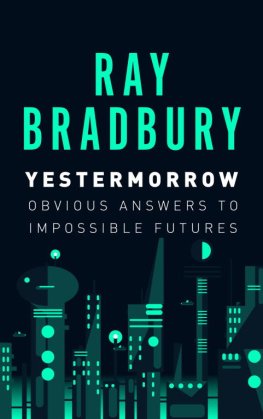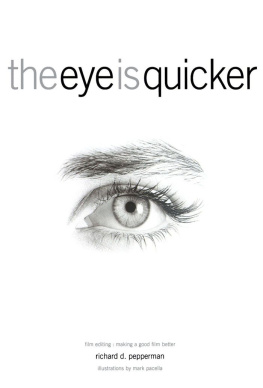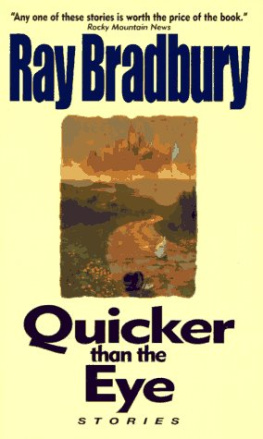Rej Bredberi - Quicker Than The Eye
Here you can read online Rej Bredberi - Quicker Than The Eye full text of the book (entire story) in english for free. Download pdf and epub, get meaning, cover and reviews about this ebook. genre: Prose. Description of the work, (preface) as well as reviews are available. Best literature library LitArk.com created for fans of good reading and offers a wide selection of genres:
Romance novel
Science fiction
Adventure
Detective
Science
History
Home and family
Prose
Art
Politics
Computer
Non-fiction
Religion
Business
Children
Humor
Choose a favorite category and find really read worthwhile books. Enjoy immersion in the world of imagination, feel the emotions of the characters or learn something new for yourself, make an fascinating discovery.

- Book:Quicker Than The Eye
- Author:
- Genre:
- Rating:4 / 5
- Favourites:Add to favourites
- Your mark:
- 80
- 1
- 2
- 3
- 4
- 5
Quicker Than The Eye: summary, description and annotation
We offer to read an annotation, description, summary or preface (depends on what the author of the book "Quicker Than The Eye" wrote himself). If you haven't found the necessary information about the book — write in the comments, we will try to find it.
Quicker Than The Eye — read online for free the complete book (whole text) full work
Below is the text of the book, divided by pages. System saving the place of the last page read, allows you to conveniently read the book "Quicker Than The Eye" online for free, without having to search again every time where you left off. Put a bookmark, and you can go to the page where you finished reading at any time.
Font size:
Interval:
Bookmark:
Ray Bradbury
Quicker Than The Eye
It was at a magic show I saw the man who looked enough like me to be my twin.
My wife and I were seated at a Saturday night performance, it was summer and warm, the audience melting in weather and conviviality. All around I saw married and engaged couples delighted and then alarmed by the comic opera of their lives which was being shown in immense symbol onstage.
A woman was sawed in half. How the husbands in the audience smiled.
A woman in a cabinet vanished. A bearded magician wept for her in despair. Then, at the tip-top of the balcony, she appeared, waving a white-powdered hand, infinitely beautiful, unattainable, far away.
How the wives grinned their cat grins!
Look at them! I said to my wife.
A woman floated in midair a goddess born in all men's minds by their own true love. Let not her dainty feet touch earth. Keep her on that invisible pedestal. Watch it! God, don't tell me how it's done, anyone! Ah, look at her float, and dream.
And what was that man who spun plates, globes, stars, torches, his elbows twirling hoops, his nose balancing a blue feather, sweating everything at once! What, I asked myself, but the commuter husband, lover, worker, the quick luncher, juggling hour, Benzedrine, Nembutal, bank balances, and budgets?
Obviously, none of us had come to escape the world outside, but rather to have it tossed back at us in more easily digested forms, brighter, cleaner, quicker, neater; a spectacle both heartening and melancholy.
Who in life has not seen a woman disappear?
There, on the black, plush stage, women, mysteries of talc and rose petal, vanished. Cream alabaster statues, sculptures of summer lily and fresh rain melted to dreams, and the dreams became empty mirrors even as the magician reached hungrily to seize them.
From cabinets and nests of boxes, from flung sea-nets, shattering like porcelain as the conjurer fired his gun, the women vanished.
Symbolic, I thought. Why do magicians point pistols at lovely assistants, unless through some secret pact with the male subconscious?
What? asked my wife.
Eh?
You were muttering, said my wife.
Sorry. I searched the program. Oh! Next comes Miss Quick! The only female pickpocket in the world!
That can't be true, said my wife quietly.
I looked to see if she was joking. In the dark, her dim mouth seemed to be smiling, but the quality of that smile was lost to me.
The orchestra hummed like a serene flight of bees.
The curtains parted.
There, with no great fanfare, no swirl of cape, no bow, only the most condescending tilt of her head, and the faintest elevation of her left eyebrow, stood Miss Quick.
I thought it was a dog act, when she snapped her fingers.
Volunteers. All men!
Sit down. My wife pulled at me.
I had risen.
There was a stir. Like so many hounds, a silently baying pack rose and walked (or did they run?) to the snapping of Miss Quick's colorless fingernails.
It was obvious instantly that Miss Quick was the same woman who had been vanishing all evening.
Budget show, I thought; everyone doubles in brass. I don't like her.
What? asked my wife.
Am I talking out loud again?
But really, Miss Quick provoked me. For she looked as if she had gone backstage, shrugged on a rumpled tweed walking suit, one size too large, gravy-spotted and grass-stained, and then purposely rumpled her hair, painted her lipstick askew, and was on the point of exiting the stage door when someone cried, You're on!
So here she was now, in her practical shoes, her nose shiny, her hands in motion but her face immobile, getting it over with.
Feet firmly and resolutely planted, she waited, her hands deep in her lumpy tweed pockets, her mouth cool, as the dumb volunteers dogged it to the stage.
This mixed pack she set right with a few taps, lining them up in a military row.
The audience waited.
That's all! Act's over! Back to your seats!
Snap! went her plain fingers.
The men, dismayed, sheepishly peering at each other, ambled off. She let them stumble half down the stairs into darkness, then yawned:
Haven't you forgotten something?
Eagerly, they turned.
Here.
With a smile like the very driest wine, she lazily unwedged a wallet from one of her pockets. She removed another wallet from within her coat. Followed by a third, a fourth, a fifth! Ten wallets in all!
She held them forth, like biscuits, to good beasts. The men blinked. No, those were not their wallets! They had been onstage for only an instant. She had mingled with them only in passing. It was all a joke. Surely she was offering them brand-new wallets, compliments of the show!
But now the men began feeling themselves, like sculptures finding unseen flaws in old, hastily flung together armatures. Their mouths gaped, their hands grew more frantic, slapping their chest-pockets, digging their pockets.
All the while Miss Quick ignored them to calmly sort their wallets like the morning mail.
It was at this precise moment I noticed the man on the far right end of the line, half on the stage. I lifted my opera glasses. I looked once. I looked twice.
Well, I said lightly. There seems to be a man there who somewhat resembles me.
Oh? said my wife.
I handed her the glasses, casually. Far right.
It's not like you, said my wife. It's you!
Well, almost, I said modestly.
The fellow was nice-looking. It was hardly cricket to look thus upon yourself and pronounce favorable verdicts. Simultaneously, I had grown quite cold. I took back the opera glasses and nodded, fascinated. Crew cut. Horn-rimmed glasses. Pink complexion. Blue eyes
Your absolute twin! cried my wife.
And this was true. And it was strange, sitting there, watching myself onstage.
No, no, no, I kept whispering.
But yet, what my mind refused, my eye accepted. Aren't there two billion people in this world? Yes! All different snowflakes, no two the same! But now here, delivered into my gaze, endangering my ego and my complacency, here was a casting from the same absolutes, the identical mold.
Should I believe, disbelieve, feel proud, or run scared? For here I stood witness to the forgetfulness of God.
I don't think, said God, I've made one like this before.
But, I thought, entranced, delighted, alarmed: God errs.
Flashes from old psychology books lit my mind.
Heredity. Environment.
Smith! Jones! Helstrom!
Onstage, in bland drill-sergeant tones, Miss Quick called roll and handed back the stolen goods.
You borrow your body from all your forebears, I thought. Heredity.
But isn't the body also an environment?
Winters!
Environment, they say, surrounds you. Well, doesn't the body surround, with its lakes, its architectures of bone, its overabundances, or wastelands of soul? Does not what is seen in passing window-mirrors, a face either serene snowfalls or a pitted abyss, the hands like swans or sparrows, the feet anvils or hummingbirds, the body a lumpy wheat-sack or a summer fern, do these not, seen, paint the mind, set the image, shape the brain and psyche like clay? They do!
Bidwell! Rogers!
Well, then, trapped in the same environmental flesh, how fared this stranger onstage?
In the old fashion, I wanted to leap to my feet and call, What o'clock is it?
And he, like the town crier passing late with my face, might half mournfully reply, Nine o'clock, and all's well.
But was all well with him?
Question: did those horn-rims cover a myopia not only of light but of spirit?
Question: was the slight obesity pressed to his skeleton symbolic of a similar gathering of tissue in his head?
Font size:
Interval:
Bookmark:
Similar books «Quicker Than The Eye»
Look at similar books to Quicker Than The Eye. We have selected literature similar in name and meaning in the hope of providing readers with more options to find new, interesting, not yet read works.
Discussion, reviews of the book Quicker Than The Eye and just readers' own opinions. Leave your comments, write what you think about the work, its meaning or the main characters. Specify what exactly you liked and what you didn't like, and why you think so.




